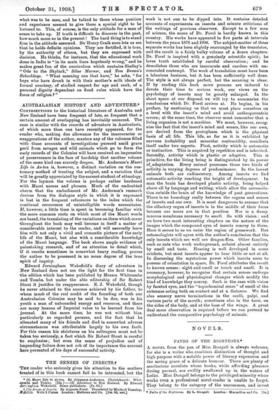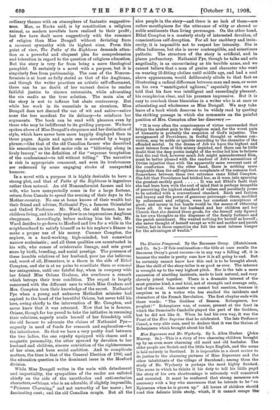NOVELS.
PATHS OF THE RIGHTEOUS.* A NOVEL from the pen of Miss Dougall is always welcome, for she is a writer who combines distinction of thought and high purpose with a notable power of literary expression and the saving grace of a delicate humour. There are plenty of meritorious novelists whose books, while affording pleasure during perusal, are swiftly swallowed up in the waters of Lathe. Miss Dougall belongs to the privileged minority whose works even a professional novel-reader is unable to forget. They belong to the category of the uncommon, and invest Paths of the Righteous. By L. Dougall. London : Macmillie and Co. [6..] ordinary themes with an atmosphere of fantastic suggestive- ness. Man, as Burke said, is by constitution a religious animal, as modern novelists have realised to their profit; but few have dealt more suggestively with the romance of religion than Miss Dougall without deviating from a reverent sympathy with its highest aims. From this point of view, The Paths of the Righteous demands atten- tion as a powerful and eloquent plea for comprehension and toleration in regard to the question of religious education. But the story is very far from being a mere theological pamphlet. It certainly is a novel with a purpose, but it is singularly free from partisanship. The case of the Noncon- formists is at least as fully stated as that of the Anglicans, and though the writer practises an artistic self-effacement, there can be no doubt of her earnest desire to render faithful justice to sincere extremists, while advocating the via media as the true solution. The main aim of the story is not to inflame but abate controversy. But while her work in its essentials is an eirenicon, Miss Dougall does not discard the use of wit and satire—satire none the less mordant for its delicacy—to reinforce her arguments. The book can be read with pleasure even by those who may be indifferent to its guiding purpose. We have spoken above of Miss Dougall's eloquence and her distinction of style, which have never been more happily displayed than in these pages. Again and again one is arrested by a happy phrase,—like that of the old Canadian farmer who described his sensations on his first motor ride as "billowing along in lively luxury," or the definition of the "supreme temptation of the confessional—to tell without telling." The narrative is rich in appropriate ornament, and even its irrelevances are redeemed by some engaging stroke of unexpected humour.
In a novel with a purpose it is highly desirable to have a strong plot, and that of Paths of the Righteous is ingenious rather than natural. An old Nonconformist farmer and his wife, who have unexpectedly come in for a large fortune, return from Canada to spend the evening of their days in the Mother-country. No one at home knows of their wealth but their friend and adviser, Nathaniel Pye, a famous Orientalist and Oxford Professor. Mr. Ward, the old farmer, has no children living, and his only nephew is an impecunious Anglican clergyman. Accordingly, before making him his heir, Mr. Ward decides to go down to Mosford and live for a while in the neighbourhood to satisfy himself as to his nephew's fitness to make a proper use of his money. Cumnor Compton, the nephew, is a hard-working, high-minded, but somewhat narrow ecclesiastic ; and all these qualities are accentuated in his wife, who comes of aristocratic lineage, and sets great store by birth, breeding, and social prestige. The presence of these humble relatives of her husband, poor (as she believes) and, worst of all, Dissenters, is a thorn in the side of Ethel Compton, and she is at no pains to conciliate them or conceal her antagonism, until one fateful day, when in company with her friend Miss Oriane Graham, she overhears a remark which betrays their true condition. The sequel is largely concerned with the different uses to which Miss Graham and Mrs. Compton turn their knowledge of the secret. Nathaniel Pye when a young and unknown Methodist minister had aspired to the hand of the beautiful Oriaue, but never told his love, owing chiefly to the intervention of Mr. Compton, and never knew that it was returned. Now that he is famous, Oriane, though far too proud to take the initiative in resuming their relations, eagerly avails herself of her friendship with the old farmer to advocate the claims of Nathaniel Pye- urgently in need of funds for research and exploration—to the inheritance. So that we have a very pretty duel between the two ladies, the one royally equipped with charm and a magnetic personality, the other spurred by devotion to her husband and children, sincere conviction of the righteousness of her aims, and keen social ambition. And to complicate matters, the time is that of the General Election of 1906, and the education question is the dominant issue in the Mosford division.
While Miss Dougall writes in the main with detachment and impartiality, the sympathies of the reader are enlisted chiefly on the side of the unorthodox and anti-sectarian characters,—Oriane, who is an adorable, if slightly impossible, "Princess Charming," and not unworthy of her name ; her fascinating aunt; and the old Canadian couple. But all the
nide people in the story—and there is no lack of them—are rather mouthpieces for the utterance of witty or shrewd or noble sentiments than living personages. On the other hand, Ethel Compton is a masterly study of interested devotion, of " conscientious self-deception. For all her snobbery and insin- cerity, it is impossible not to respect her intensity. She is often ludicrous, but she is never contemptible, and soinetimes pathetic. The structure of the story is artificial, and in places perfunctory. Nathaniel Pye, though he talks and acts angelically, is as unconvincing as his terrible name, and we cannot believe that a man of genius and character who went on wearing ill-fitting clothes until middle age, and bad a soul above appearances, would deliberately allude to that fact RS - illustrating a radical difference between man and man, or muse on his own "unmitigated ugliness," especially when we are• told that his face was intelligent and exceedingly pleasant, his complexion clear, and his presence impressive. But it is easy to overlook these blemishes in a writer who is at once so stimulating and wholesome as Mies Dougall. We may take leave of a book which deserves to be widely read by quoting the striking passage in which she comments on the painful, position of Mrs. Compton after her discovery :-- "It is very often the consciousness of virtue unrewarded that - brings the acutest pain to the religious mind, for the worst pain of humanity is probably the suspicion of God's injustice. The arraignment of Providence, in fretful thought or solemn con- viction, may be noble or ignoble according to the character of the offended mortal. In the drama of Job we have the highest and most intense form of this misery depicted, and there can be little doubt that the deep poetic insight of the writer led him to believe - that the real God, however much Job might misunderstand Him, must be better pleased with the candour of Job's accusations of• Divine injustice than with the apparently more reverent cant of the comforters. On the other hand, there is nothing more despicable than the self-righteous complaints of the common fool. Somewhere between these two extremes came Ethel Compton. She felt that Providence had tricked her, as it were, into spurning the greatest earthly good It was not Ethers fault that she had been born with the sort of mind that is perhaps incapable of perceiving the highest standard of values and peculiarly prone to be satisfied with a conventional standard. Rank and fashion and luxury and the power of generous patronage—these, modified by refinement and religion, were her constant conceptions of good; and money in her hands would be the means of obtaining them all. It was for her husband and her children and her Church that she desired these goods, for she herself only figured in her own thoughts as the dispenser of the family fortunes and the parish ministrant. She wanted nothing for herself as herself ; she never thought of herself except as wife and mother and parish visitor, but in those capacities she felt the most intense hunger- for the advantages of wealth."















































 Previous page
Previous page